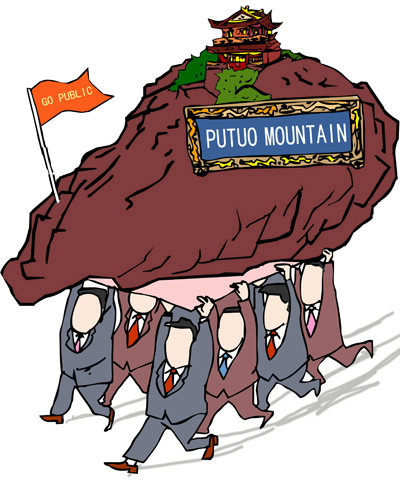|
 |
|
(LI SHIGONG) |
Money and religion have always been at odds, and when several famous Buddhist temples in China recently sought to go public, the line separating religion and riches was blurred again. The Putuo Mountain, one of China's four major Buddhist mountains, drew particular attention when its officials announced their intention to go public. The news triggered widespread debates over whether religious institutions should be listed.
As a holy place of Buddhism, the news of the Putuo Mountain's going public is astonishing. Some people have asked whether any place is immune to the corrupting influence of money. Because the religious sites are public resources, it's assumed that economic benefits should not be the only criterion for determining how well the mountains are operated. The impact on visitors and the religious community from listing sacred places on the stock market should be taken into consideration.
In response to the controversy, some said it is okay for religious monuments to go public, since it is not the holy mountain itself that is commercialized, but rather the relevant tourism companies. At the same time, others are worried that when these prestigious temples get involved in commercial activities, their holy atmosphere and culture will be polluted and commercialized.
Make it public
Chen Jie (Beijing Business Today): As long as there is a balance between cultural protection and profit making, it's all right for these holy places to get listed. In the context of the market economy, these scenic spots are actually already operating under companies. The Putuo Mountain is now under the Putuo Mountain Tourism Development Co. Ltd. Since 1997, the Emei Mountain has belonged to the Emei Mountain Tourism Co. Ltd., which is listed on the Shenzhen Stock Exchange and benefits from the capital market. Like any company, they need to spend and also make money. As tourist destinations, these famous cultural and religious spots require expenses for publicity and environmental improvement. Apart from small government subsidies, they must raise funds through market operations. As operating costs rise, the need for moneymaking ventures naturally comes up. Therefore, capable tourism companies operating scenic spots should be allowed to go public in order to bring in funds to continue operations. Most importantly, these companies must spend the money on the maintenance and improvement of the mountain scenery and historical culture. Business managers should realize that the treasure of the mountains depends on the good image that has taken shape over hundreds or thousands of years. If the image is ruined and the precious scenery is abused, few would like to invest in them and tourism would decline. In short, attention should be paid to strike a balance between culture and profits. Beware of using famous natural and cultural resources as a tool to collect money.
Liu Simin (The Beijing News): Although religious resources themselves should not go public, their surrounding tourism resources should be allowed to do so. In China and across the world, holy sites tend to be major tourism destinations, so the surrounding commercial atmosphere is not easily curbed regardless of whether they are on the stock market. I think we should allow religious resources to serve tourism resources indirectly.
The public's worries, of course, are not baseless. Given the negative impact of commercialization on some scenic spots, it's necessary to make careful preparations before the mountains go public. With careful planning and consideration, the religious resources may be even better protected in the future.
Wang Qingyong (www.cnhubei.com): Going public will not necessarily affect the purity of Buddhism. If going public can help to popularize the religion, it will have a very positive impact on this tradition's further development in modern society.
Some people are worried that these holy Buddhist places will be used as a way to make huge sums of money. These worries are not unfounded, but the problems are not limited to famous tourism destinations that are listed in the stock market. Today, almost all tourist places of historical interest are raising the prices of admission tickets again and again—and religious sites are no exception.
In modern society, every sector is competing to survive. Although Buddhism teaches people to restrain their desires, the promotion of Buddhism through these sites' going public will help allow Buddhist ideas to spread.
It's possible that after some Buddhist sites enter the stock market, relevant tourism companies may focus on making money and neglect their social responsibilities to the holy places. Therefore, the leaders of the companies should be required to limit excessive commercial activities that damage the purity of Buddhism.
Religious and tourism authorities should make joint efforts to supervise the commercial operation of prestigious Buddhist mountains to ensure their involvement in the stock market will help to protect and develop the religion and the culture.
| 